Once and forever, there's Orpheus, wherever there's a song
- msteadman
- Sep 30, 2025
- 1 min read

Dust Ensemble's performance Goat Song (2024) is inspired by the Orpheus myth, with Orpheus, the singer, musician, poet, who could charm all things: animals, rivers, trees and even stones. Set in an anonymous town, which has fallen into a strange silence, the performance was also inspired by my unintentional trip to Llantwich Major, in Wales. Wales is also known as the "Land of Song'.
In our story, Orpheus has to return to the town; he is 'called' back by the death of Eurydice, and the silence of unmourned grief is overwhelming. When I visited Llantwich Major, I had the overwhelming feeling of silence, as if the town was on mute. Its eerie effect led me to research the history of the town, to find a source that stated it had once been the home of the 'perpetual choirs' where either druids, monks or saints chanted around the clock for the peace and enchantment of Britain. At one point, over 2400 voices were singing, 100 for every hour of the day and night. The chanting stopped with the invasion of the Vikings in approximately 900AD.
Goat Song is a story about the loss of the song. Orpheus is a shaman who needs to recover the lost songs and voices of a place. What is it to live without song? Without love and music? As I listen to my Welsh ancestors, I am drawn to the town, to the land of song, with Orpheus, Eurydice and Death in tow, to explore how the erasures and absences in history haunt as a spectral absence and intergenerational trauma.





Comments